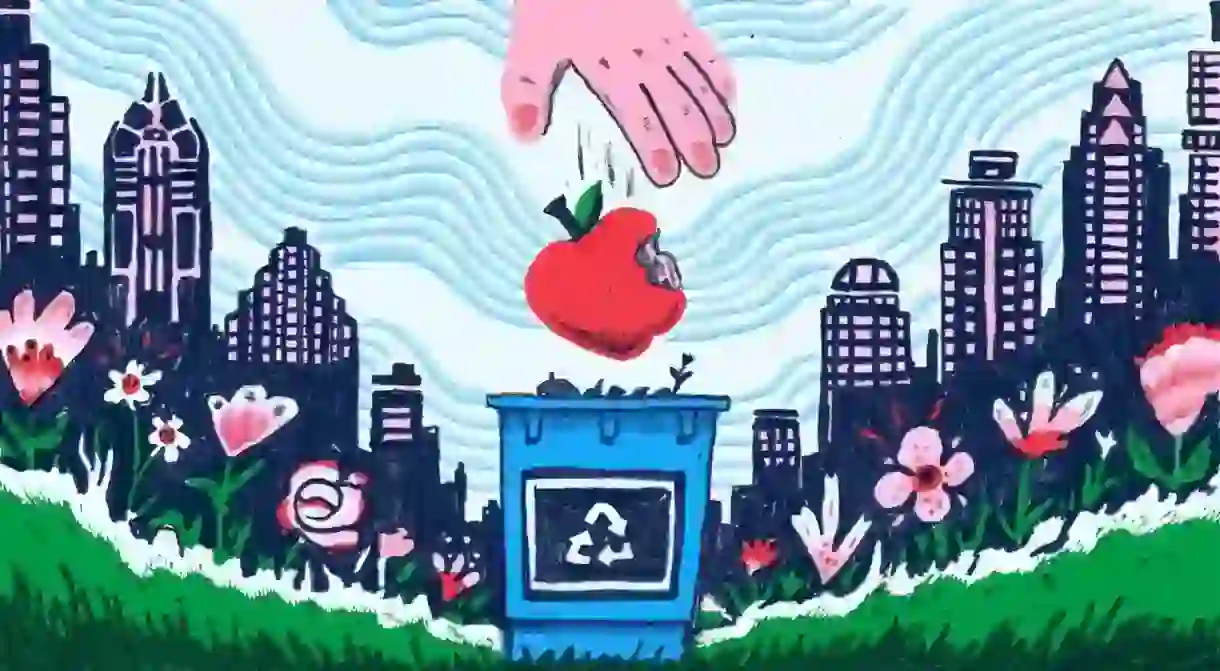SXSW Helps Austin Break Ground with Its New Food Waste Law

As sustainable dining practices become an increasingly pivotal issue in the US, cities like Austin, Texas, are leading the way with game-changing food waste laws.
With the help of compatible organizations like the influential SXSW Conference & Festival, the city just implemented a law that requires restaurants to donate or compost all food waste.
Groundbreaking legislation
Austin is the latest American city to take a firm stand on food waste, following San Francisco, which passed groundbreaking legislation that made composting mandatory in 2009. The Austin law extends well beyond restaurants, though, to include any operation whatsoever that serves food – farmers’ markets and retail shops included. This means come closing time, it’s illegal for businesses to throw away any remaining food. Instead, they have the option to either donate to charities, compost or give to animal farms.
By cutting back on food waste, the city has the potential to put a big dent in its overall landfill, as organic, compostable food items comprise about 40 percent of Austin’s waste.
Major charitable organizations such as Feeding America fully support the new law. “Feeding America appreciates any program that redirects nutritious food to help families in need,” says Liz Baldridge, Director of Sustainability and Food Waste Initiatives at Feeding America. “At the same time that 40 million Americans are food insecure, 40 percent of food in the United States is wasted each year, making it critical for companies to create food waste diversion plans like the Austin law mandates. The more we can do to address wasted food constructively, the further we get in ending hunger.”

Beyond food scraps, other items like paper towels, napkins, flowers and garden trimmings are also required to be composted. For anyone who doesn’t adhere to the law, fines can reach up to $2,000.
The city is also harnessing the power of education in its efforts to implement the law. It now requires food-service organizations to teach employees about the new law and post visible signage that enforces it. These places must also submit an annual “Organic Diversion Plan” that outlines their practices and efforts in eliminating food waste.
Austin gets greener
For Austin, a city rapidly asserting itself as a progressive and eco-friendly American oasis, the law is the latest in a series of other recent food waste developments, such as last year’s massively expanded curbside composting program, which saw the addition of 38,000 homes to the service. The new law builds on Austin’s Universal Recycling Ordinance, which mandates that property owners must supply recycling options for residents and employees. The plans are part of an overarching goal to achieve Zero Waste by 2040.
The SXSW effect
When it comes to highlighting these issues, it helps having powerful voices like SXSW leading the charge. The annual conference and event series has lately become as much about food issues as it is about live music. Notable chefs and television personalities, such as Jose Andres and Cat Cora, convene at SXSW to discuss topics like technology in kitchens, financial responsibility, social issues and, of course, food waste.
One such panel at this year’s festival was all about re-imagining food waste, aimed squarely at the 130 billion pounds of food wasted each year in the US. The session addressed solutions for reducing that number, with insight from celebrity chef Marco Canora and Food Tank’s president Danielle Nierenberg.

According to Nierenberg, the new law is an example of what states can do when they take food waste issues into their own hands. “States are taking it upon themselves to create interesting legislation, which can then pass to other places and have a lot of potential,” she explains. “It will create some consciousness, not only among chefs and restaurateurs, but among consumers that will now go ‘oh gosh, I do contribute to waste.'”
In addition to creating awareness, it can also create a ripple effect. “Austin is a city that’s ahead in a lot of things,” Neirenberg adds. “What they’re doing can easily be replicated and scaled in other cities.”
Robert Lee, Chief Executive Officer of Rescuing Leftover Cuisine, Inc., echoes those sentiments. “Austin has done what every city in America should do, and has led the way for concrete action to be done in eliminating food waste while providing food to the hungry along the way,” he says. “Soon, the new standard protocol for restaurants and food businesses will be to donate their excess food and compost it instead of throwing it away.”
Environmentally-conscious chefs and restaurateurs praise the law as well. “While this law doesn’t change or affect us in any way, as we’ve been doing this for nearly a decade, I think it’s important to make our industry and the city more sustainable,” proclaims Bryce Gilmore, chef/owner of Odd Duck, an Austin restaurant known for its sustainable practices. “This is a great step forward in more sustainability and I hope that other cities see Austin as an example and make the same, or similar, changes.”
Indeed, numerous other cities, from Seattle to Minneapolis, are following suit with their own regulations and waste-reduction goals. As population hubs for the country, cities like these have the power to exhibit palpable change for a greener future.













